what is the exact diet to eat daily for nutrtional perfection
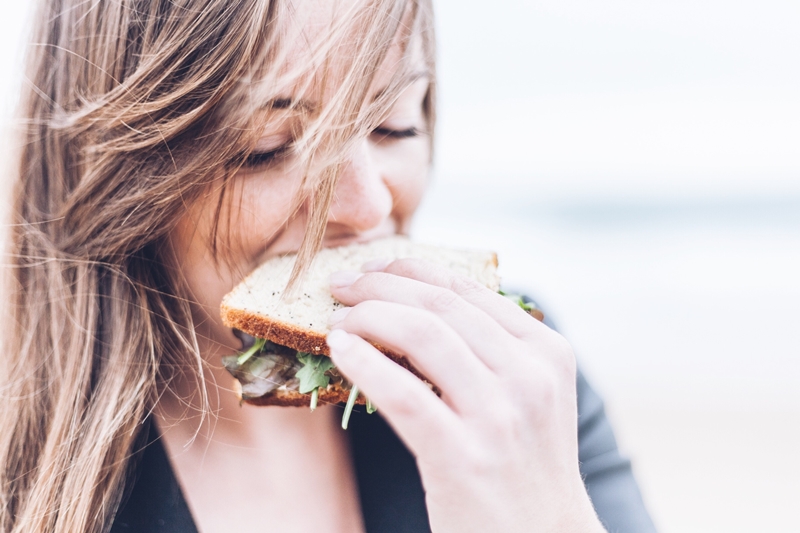 Would you rather listen to this article? Utilise the player below or download on iTunes.
Would you rather listen to this article? Utilise the player below or download on iTunes.
Does it e'er feel similar you spend way more fourth dimension than y'all should accept to thinking about food? What y'all should swallow and shouldn't swallow; how many meals you should eat; are any foods all-time for fat loss; what'southward best for improving overall wellness; is there such a thing equally an all-you-tin can-swallow peanut butter nutrition; are total calories or food quality more than important.
Eating healthy is complicated.
Not really. Eating healthy seems complicated because of the affluence of information on food, weight loss, disease prevention and what you should and shouldn't swallow to await better naked. It'south no wonder people are frustrated and discouraged considering they've tried pop diets that promised to be the diet for effortless fat loss: low fat, depression carb, vegetarian, intermittent fasting, ketogenic, and all the remainder.
The Basics are Not Replaceable
It'due south not uncommon for someone to read the information below and scoff that it's "likewise uncomplicated." They want more than the basics. They recollect a diet that emulates their favorite Instagram fit-pro'south habits will yield amend results. They think they're above the basics.
The problem, however, is that most people accept not fifty-fifty mastered the basics. Circuitous, restrictive diets that eliminate foods or nutrient groups don't produce ameliorate, lasting results — they just reduce calorie intake. People falsely think they're more effective because of their complexity. These unnecessarily obsessive, restrictive diets tin atomic number 82 to things you don't want like binge eating, negative body image, or incessant yo-yo dieting.
Complex or complicated does non mean better. Don't delude yourself into thinking yous need something more than advanced if yous don't apply the information shared here for months at a time.
Exercise You Want a Diet or a Lifestyle?
Nigh diets have a timeframe. You follow information technology for 12-xvi weeks (or until your willpower bleeds dry) and so y'all're done and go back to eating whatever was normal pre-diet, or worse because you can't stop eating all the stuff that was banned from the diet. Sound familiar?
Someone who volition stand up on phase in a bikini to be judged volition follow a diet that meticulously tracks calories to reach ultra-low levels of body fat that'due south meant to exist sustained for a short period of fourth dimension (people often forget this part and retrieve it's like shooting fish in a barrel, or healthy, to have very low body fat levels long term). Problems arise when the average person who just wants to experience bang-up and look better naked attempts to mimic those diets.
Most people need to create a sustainable lifestyle built upon simple habits that can be maintained long term. Not for 12-16 weeks, just for 12-sixteen months and beyond. A major distinction between a diet and lifestyle: quick-gear up diets instill a perfection mindset (never missing a meal, hitting the exact calorie target every day, never "cheating," you become all in); a salubrious-eating lifestyle is virtually consistency, not perfection, and so there's no brunt or stress of thinking you need to be perfect 24-hour interval in, day out — it is non an "all or nothing" game.
Rigid diets that create a perfection-obsessed mindset around food can drown you in their monstrous wake of negative body prototype and disordered eating habits.
You Must Find Pleasure in the Process
You can simply force yourself to follow a mode of eating yous hate, or that dominates your life, for so long. Eventually you lot'll say Spiral information technology! and throw your hands in the air every bit a proclamation of frustration and signaling the end of the diet'southward lifespan.
Many people mistakenly look at eating healthy as being torturous, bland, boring, difficult. Establishing improve eating habits may be hard in the beginning, depending on your current food habits, merely y'all must focus on the pleasure that accompanies the process. The pleasance of nourishing your trunk; properly fueling and recovering from workouts; forging new habits that serve you; actively investing in your health; proving to yourself you can establish rewarding, positive habits.
If you go frustrated from trying to notice vegetables or lean-protein sources yous enjoy, or take trouble hitting the fourscore% whole-food target discussed below, refocus on the pleasures you should be reaping from this lifestyle alter.
Does It Take to be most Fat Loss?
Tips for weight loss are laced throughout this article, because many people want to lose fat. If you're burned out on constantly thinking near fat loss, watching what y'all eat, or otherwise beingness on a never-ending journey of trying to whittle downwards to a smaller size, don't call back almost fatty loss.
If your brain is begging for a intermission from basing every food choice on losing body fat, choose other reasons for changing your eating habits. Cull to adjust your eating choices to:
- Improve overall health (concrete and mental)
- Increase energy levels
- Improve sleep quality
- Fuel and recover from workouts
- Boring down the crumbling process
- Contribute to self-care
- Increase physical strength and build muscle
There are, as you can see, lots of reasons to eat well that have nothing to practice with fatty loss. Depending on your history information technology may behoove you to say Screw fat loss! and focus on other salubrious eating benefits.
How to Eat Salubrious
Whatever your why may be for wanting to eat healthy, hither are the foods that should make up most of your eating choices.
Swallow These Foods Well-nigh of The Time
The common thread connecting these foods — they're minimally processed whole foods. Why have these foods been called? Because eating mostly food-dense whole foods, including lots of plant-based foods, has been shown to exist most important for improving wellness and warding off disease.
The following images and examples are not exhaustive, and many could fall in other categories. Eggs, for instance, could be listed in the fat and protein groups just appear under fats; corn is a grain when eaten as popcorn just considered a starchy vegetable when consumed as corn on the cob. Don't get obsessed with minor details but use this as a guide for building meals and snacks.
Fats
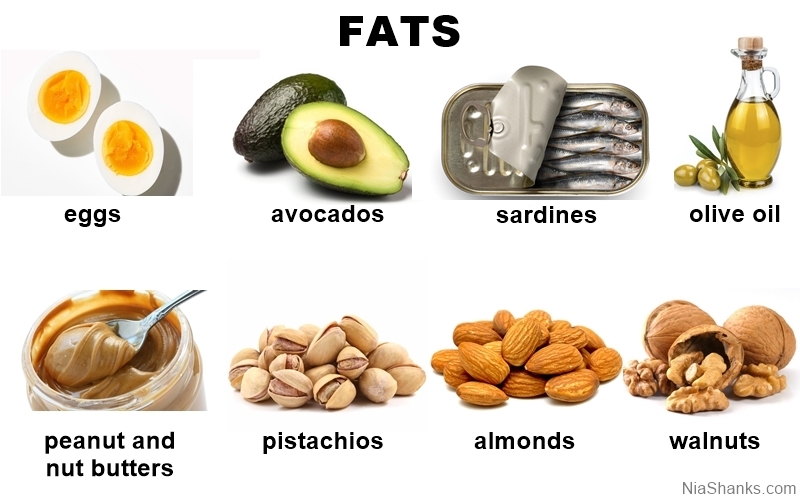 These whole-nutrient sources are packed with healthy fats. Other examples not shown include fatty fish like salmon and mackerel; plant sources include flax seeds, olives, chia seeds.
These whole-nutrient sources are packed with healthy fats. Other examples not shown include fatty fish like salmon and mackerel; plant sources include flax seeds, olives, chia seeds.
Protein
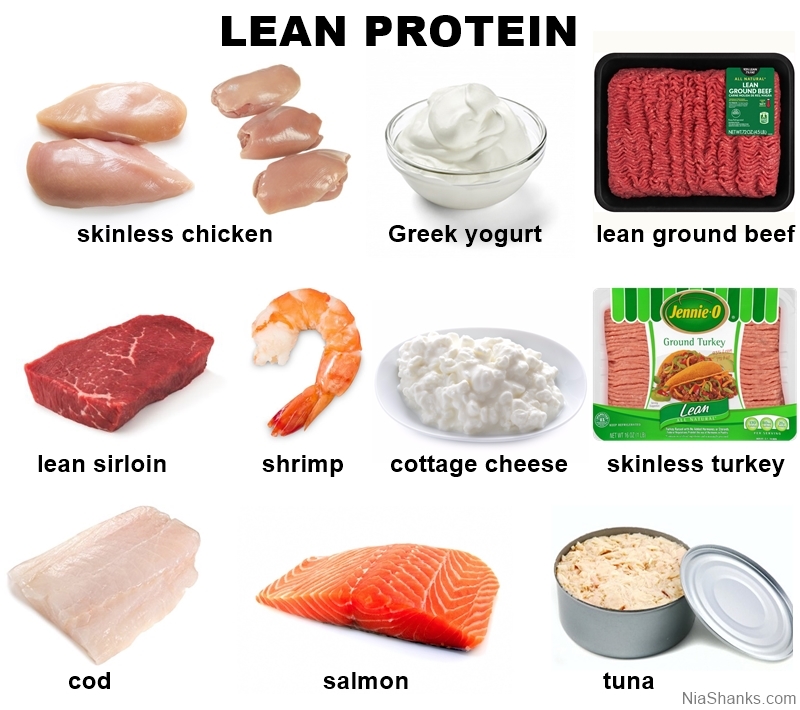 Notice that lean sources of protein are shown. Fattier cuts of meat and dairy are fine but shouldn't make up the bulk of your protein choices.
Notice that lean sources of protein are shown. Fattier cuts of meat and dairy are fine but shouldn't make up the bulk of your protein choices.
Starchy Vegetables
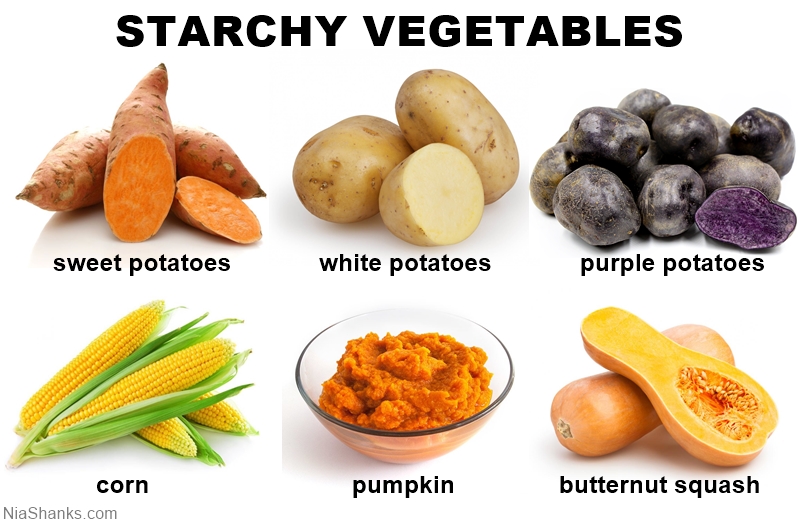
Not-Starchy Vegetables
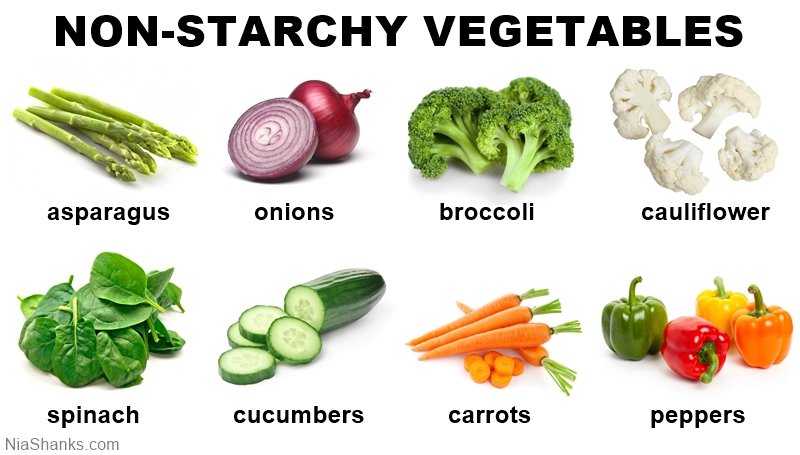 Why 2 vegetable categories? Because some people rely too much on the starchy vegetables and eat goose egg but potatoes. Potatoes are healthy and satiating, but don't neglect non-starchy veggies. A good rule of thumb is to "eat the rainbow" as often as possible so you lot get tons of nutrients in a fiber-packed package. Non-starchy veggies are a great way to increment satiety because they accept up a lot of space in the stomach without packing a lot of calories (i.east., they're high-volume, low-calorie foods).
Why 2 vegetable categories? Because some people rely too much on the starchy vegetables and eat goose egg but potatoes. Potatoes are healthy and satiating, but don't neglect non-starchy veggies. A good rule of thumb is to "eat the rainbow" as often as possible so you lot get tons of nutrients in a fiber-packed package. Non-starchy veggies are a great way to increment satiety because they accept up a lot of space in the stomach without packing a lot of calories (i.east., they're high-volume, low-calorie foods).
Bake them, sauté them, grill them, steam them, eat them raw, turn them into noodles and use in identify of traditional pasta, blend them in smoothies. Doesn't thing how you lot get them in your belly, just eat them.
Beans and Legumes
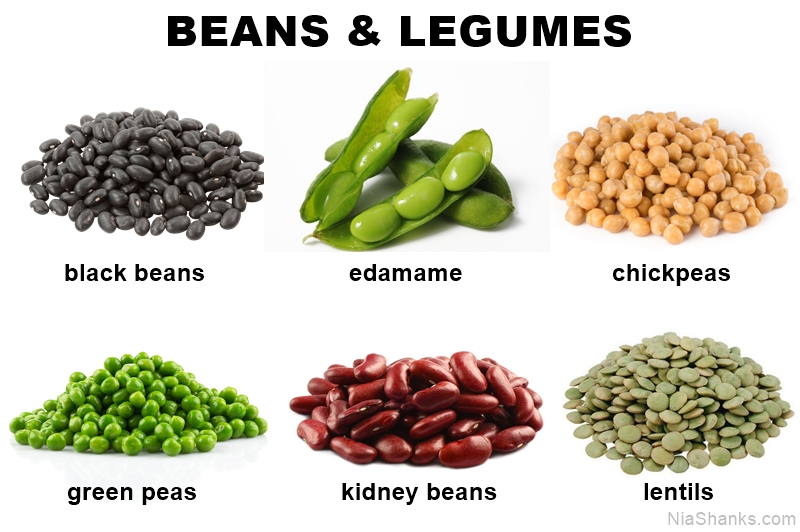 Tasty protein and fiber combined in a inexpensive bundle, especially if you buy stale beans and prepare them yourself. If y'all don't eat meat, or much of it, this will be i of your principal sources of protein. Even if yous do eat meat, include these tasty foods.
Tasty protein and fiber combined in a inexpensive bundle, especially if you buy stale beans and prepare them yourself. If y'all don't eat meat, or much of it, this will be i of your principal sources of protein. Even if yous do eat meat, include these tasty foods.
Whole Grains
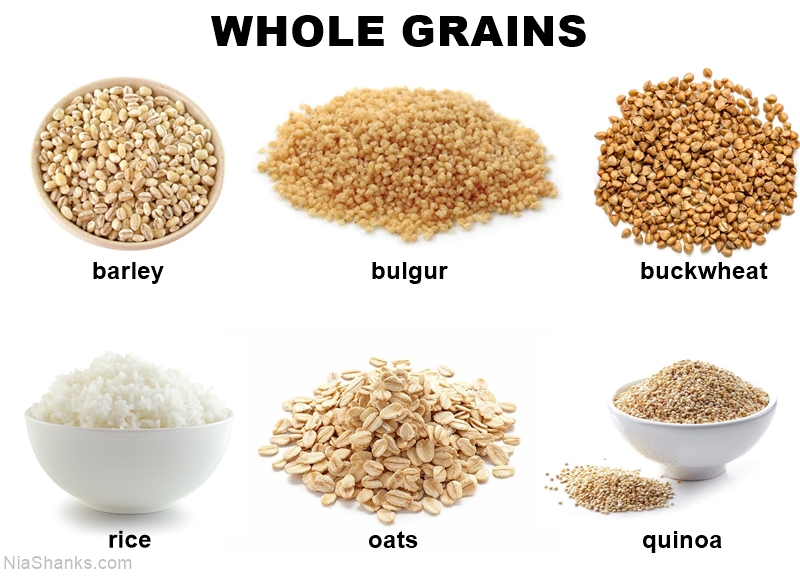 This category also includes foods similar whole wheat pasta and breads.
This category also includes foods similar whole wheat pasta and breads.
Why is white rice shown instead of brown rice — I idea dark-brown rice was "less processed" and therefore healthier, you may be wondering. In that location's not much nutritional difference betwixt white and brownish rice beyond fiber (which favors brown rice), so permit your taste decide. Some people notice white rice easier to digest than dark-brown rice. In the cease, choosing betwixt them is a infinitesimal detail non worth obsessing over.
Herbs and Spices
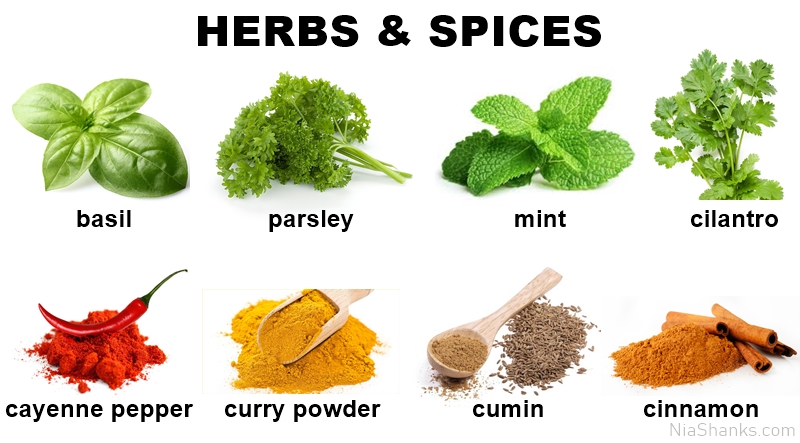 If you don't use herbs and spices with your cooking, showtime. I've cooked countless meals that were bland and boring, but the right blend of spices made these meals delightfully craveable. Notice recipes that use herbs and spices if you're not a creative cook. They tin can make the difference between a meal you feel like you have to choke down and one that creates a symphony of flavors on your tastebuds.
If you don't use herbs and spices with your cooking, showtime. I've cooked countless meals that were bland and boring, but the right blend of spices made these meals delightfully craveable. Notice recipes that use herbs and spices if you're not a creative cook. They tin can make the difference between a meal you feel like you have to choke down and one that creates a symphony of flavors on your tastebuds.
Fruits
 Choose from fresh or frozen. Canned fruits are okay if they're packed in water and don't take added sugar. Buy what's in season or on sale to relieve money. Continue apples and other easy-to-grab fruits nearby if you tend to snack often.
Choose from fresh or frozen. Canned fruits are okay if they're packed in water and don't take added sugar. Buy what's in season or on sale to relieve money. Continue apples and other easy-to-grab fruits nearby if you tend to snack often.
Recommended Article: The Chocolate Protein Milkshake That Actually Tastes Like a Milkshake
Calorie-Gratuitous Beverages
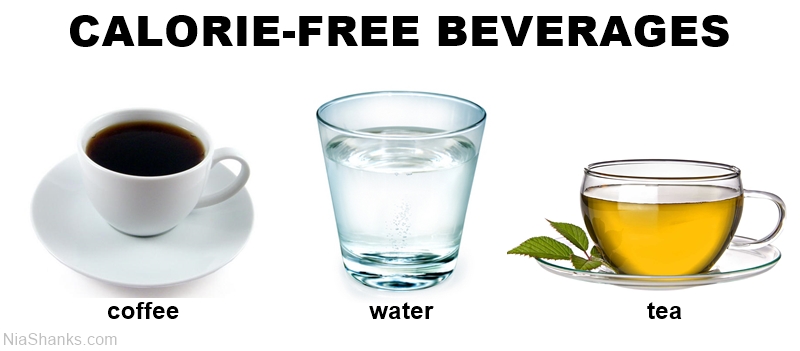 Sparkling water is another selection and the carbonation can help curb ambition. Calorie-gratuitous soft drinks are okay in moderation and tin can assist satisfy your sweetness tooth. One of the simplest changes worth making is swapping calorie-laden beverages for their calorie-complimentary or low-calorie equivalent.
Sparkling water is another selection and the carbonation can help curb ambition. Calorie-gratuitous soft drinks are okay in moderation and tin can assist satisfy your sweetness tooth. One of the simplest changes worth making is swapping calorie-laden beverages for their calorie-complimentary or low-calorie equivalent.
If you can merely beverage coffee with cream and sugar, that's fine. You don't have to force yourself to drink black coffee. This can merely become something that might need to exist kept in check if you use a lot of cream and sugar, or drink multiple cups of java throughout the day (then those spoonfuls of carbohydrate and cream add up).
Want a low-calorie way to flavor your coffee? Mix a carbohydrate-costless hot cocoa packet (they're only 25 calories) in your java. Makes a tasty low-calorie mocha.
What is "Nigh of The Time"?
The above food categories fall under the umbrella of foods to eat about of the time, meaning they should make up at to the lowest degree 80% of your food choices; this can be a daily or weekly average. The following epitome shows the percentage of whole and "fun" foods (covered next) consumed each day over the course of a week — the whole-foods boilerplate is 81%.
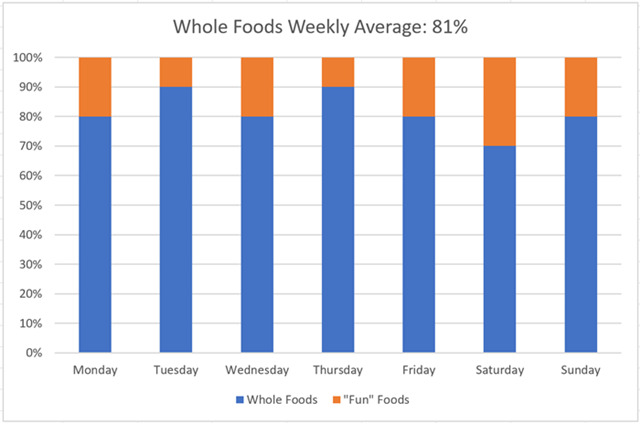 The tremendous benefit of aiming for at to the lowest degree an fourscore% boilerplate of whole foods is the flexibility it provides. Call up, this is a flexible lifestyle, not a perfection-obsessed nutrition. You can socialize and enjoy your favorite foods without feeling deprived or like you lot're "on a diet."
The tremendous benefit of aiming for at to the lowest degree an fourscore% boilerplate of whole foods is the flexibility it provides. Call up, this is a flexible lifestyle, not a perfection-obsessed nutrition. You can socialize and enjoy your favorite foods without feeling deprived or like you lot're "on a diet."
Consume These Foods Less Often
You know what to eat at least lxxx% of the fourth dimension, so let's go over the foods that can make upwards the remaining 0-20% depending on your needs and preferences.
But starting time, notice what is non being said. These foods are nifty, evil, forbidden, dirty, off limits, or guilty pleasures. Eating them does not make you bad, ugly, shameful, icky, a failure or anything else someone who wrote a nutrition book that bans these foods may have said you lot'd be if you savour them. Nor will eating these foods occasionally in reasonable amounts miraculously cause you to proceeds body fat. Only eating more than your body uses for a prolonged period causes the accumulation of body fat, and this tin can come from eating an excess of annihilation.
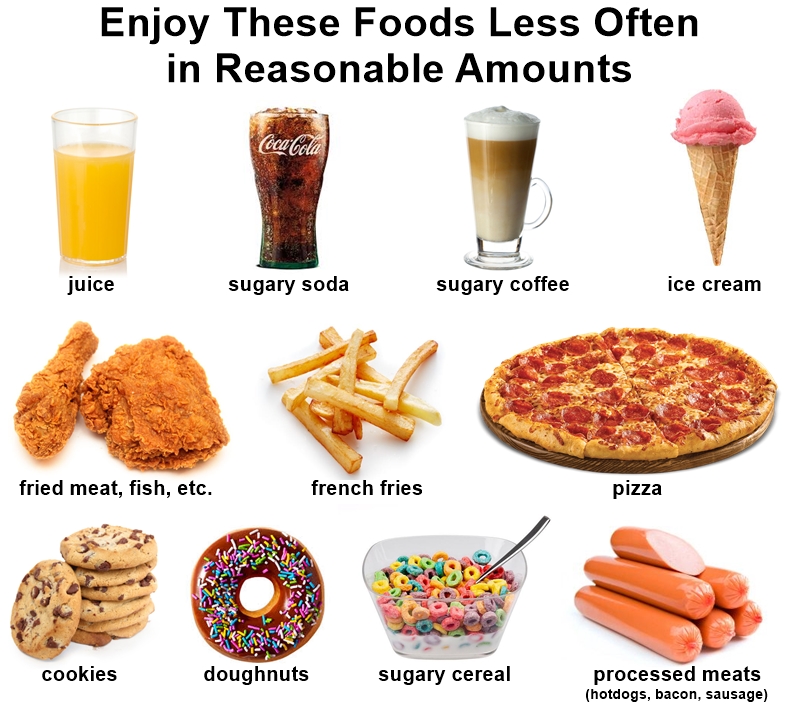 The eat less of these foods are typically calorie dense, not nutrient dumbo like the whole foods above. They're hyperpalatable by design typically using a combination of sugar, fat, and salt. For a fascinating look at how foods are intentionally and painstakingly designed to proceed us eating more and wanting to eat more than, read The End of Overeating.
The eat less of these foods are typically calorie dense, not nutrient dumbo like the whole foods above. They're hyperpalatable by design typically using a combination of sugar, fat, and salt. For a fascinating look at how foods are intentionally and painstakingly designed to proceed us eating more and wanting to eat more than, read The End of Overeating.
The best guideline for the swallow less of these foods: be consciously selective of what you will savour. Actively choose. Don't merely eat something considering it's there or someone offers it to you.
Recommended Commodity: Eating in Moderation: How to Exercise It Right
Are Candy Foods Evil?
Unless you lot grow it or hunt it yourself, your food is technically processed.
Apparently oats are processed, but they're considered a whole nutrient.
Popular Tarts are candy, and they are not a whole food.
Nutrient-of-the-gods peanut butter is processed; it's a adept source of fat that delivers some protein and is considered a whole food.
Protein powder is processed, withal information technology's a staple in many people'southward eating choices because it's a food source packaged in a convenient course, similar a stick of string cheese.
Aim to eat mostly minimally processed foods. There's a difference betwixt oats and peanut butter and Pop Tarts and fried mozzarella sticks. And, call back, if Pop Tarts and mozzarella sticks happen to be two of your favorite foods, y'all can, and should, eat them in moderation.
Why is it important to eat your favorite foods, even if they're heavily processed or deep fried and not then salubrious?
How (and Why) to Make Room for Foods You Love
Want to throw yourself into a relentless boxing with disordered and obsessive eating habits?
Heck no you don't.
The best style to avoid that miserable struggle (i.due east., the ugly side of wellness and fitness) is to not have "forbidden" or "off limit" foods, or to attempt to abstain from your favorite foods or food groups because you think they're "bad" or solely responsible for fat gain. Do not autumn into the disordered-eating trap of labeling foods "expert" and "bad" or becoming obsessively neurotic with what you swallow.
Optimizing physical health is important and is accomplished by eating more often than not whole foods. Mental wellness is also important yet is often omitted from a diet discussion, and that's a mistake. A way to help ensure y'all don't develop obsessive, unhealthy habits with food is to have flexibility built into your food choices.
Make room for your favorite foods. If a multifariousness of whole foods brand upwardly at least fourscore% of your daily/weekly food choices, you can enjoy other favorite foods in moderate amounts. Y'all don't need to have an "all or nothing" mentality that rigid diets create. You needn't "swallow perfectly" all the fourth dimension.
Practice the right things most of the time.
Information technology'due south time to stop looking at food subjectively. A cupcake is not a "bad" food that will instantly put fat on your body. A spinach salad with low-calorie dressing is not a "proficient" food that will instantly remove fat from your body.
Analyzing food similar that exacerbates, or leads to, matted eating habits. If you notice yourself looking at nutrient through a good/bad lens, make it a priority to catch yourself and kickoff reversing that mindset. If you lot typically look at a tasty cupcake and think I shouldn't eat this, it's bad, and it'll cause me to gain fat, get enlightened of that response and change the chat. Retrieve that it's a piece of food; information technology'southward cracking or evil. You can have it, enjoy information technology, so move on.
This is a lifestyle, and your favorite foods vest in your lifestyle.
To get stronger and change the shape of your body y'all must show up to the gym week afterward week and put in consistent effort. You can't go sporadically and look noticeable results. Building a healthier mindset with food requires the aforementioned commitment and consequent practice.
Tailor to Your Needs and Preferences
You know which foods should brand upwardly the bulk of your eating choices, and how to work in your other favorite foods. Great! Why do you need to "tailor" those guidelines to your needs and preferences?
Because doing something you lot savour and that fits into your life matters. A lot. An eating style is simply as effective every bit your adherence to information technology. Have the fourth dimension, if needed, to encounter how many meals per day you lot prefer to consume and any other practices you demand to adopt (or avoid, more on this below) to reach your goals.
Perchance you prefer to eat ii big meals per day because you love feeling full and eating smaller meals causes you lot to overeat. Maybe you prefer carb-rich foods, and then a low-carb diet would exist worse than getting a root culvert from a drunk dentist with a shaky hand. Maybe you need to mensurate your protein intake and loosely track calories to reach your goals.
Recommended Article: Why That Diet Didn't Piece of work for You
Possibly you lot don't know what y'all prefer because you never took the time to ask yourself, so y'all have to endeavour a few things to run into what works best. That's fine too. Becoming your ain guru and approaching your eating preferences similar a scientist tin can be a good thing. Take a pragmatic, objective approach to your eating choices. Keep emotion out of information technology. Accept notation of what works and continue doing information technology; if something doesn't piece of work or you absolutely detest it, scratch information technology off the at-least-I-tried listing and motion on to the next matter.
Does Every Meal Accept to Look Like This?
 Nope. Mine certainly don't.
Nope. Mine certainly don't.
In that location'south cipher wrong with having a vegetable, protein, and starch on your plate, just information technology doesn't mean every meal has to be made of single ingredient foods, each having its designated spot.
Some people love using that template to design their meals considering of its simplicity and the ease it provides for prepping lots of meals at once, only not me. Some of my meals look that manner, but it'due south certainly not mandatory.
I enjoy cooking and trying new recipes then I routinely brand stir-frys, casseroles, slow cooker meals, stews, chilis, curries. My criteria for most recipes is that they use mostly whole-food ingredients. (For a few recipes y'all can check out my Instagram: chicken salad, banana-oat cookies, sweet potato pumpkin curry.)
Letyourpreferences decide how your meals wait. Make what you enjoy eating.
Full Calories and Nutrient Quality
Do Calories Matter?
Yes. Using an extreme instance, you tin go on a Snickers nutrition and lose weight if you stayed in a caloric deficit. Sure, yous'd get to eat aught simply Snickers every solar day and lose weight, only yous'd probable be ravenous about of the time since an all-Snickers diet isn't very satiating. And, non to mention, you wouldn't consume enough fiber, vitamins, and other nutrients to optimize health.
The bespeak here isn't to consume cipher merely junk — it's to emphasize the point that no unmarried food or food group causes fat gain on its own.
Does That Hateful Food Quality is Less Important?
Not at all. Merely considering you tin can lose fat eating nothing but Snickers or McDonald's doesn't mean food quality is less important. Equally stated to a higher place, maximizing overall health is the primary objective, and eating mostly whole foods does that. Food quality is also important for energy levels and satiety.
Let's say your trunk needs i,900 calories per day to stay the aforementioned (i.e., if you burn 1,900 calories and eat one,900 calories, your body composition won't alter). Yous could consume 1,600 calories worth of Snickers confined each day for a month and you'd lose weight from existence in a caloric arrears, though yous probably wouldn't feel likewise swell and would likely feel ravenous hunger.
 Some people claim you'd instantly pack on fat eating nothing but Snickers confined because of the insulin response, only that'southward incorrect. An insulin response won't lead to fat storage in the absence of a caloric surplus.
Some people claim you'd instantly pack on fat eating nothing but Snickers confined because of the insulin response, only that'southward incorrect. An insulin response won't lead to fat storage in the absence of a caloric surplus.
Dissimilarity this candy-bar diet with eating 1,600 calories of nutritious whole foods from the eat more of these foods discussed above for a month and weight loss would occur, but unlike the all-Snickers nutrition you lot'd experience greater satiety from the higher intake of protein and cobweb and higher book whole foods provide.
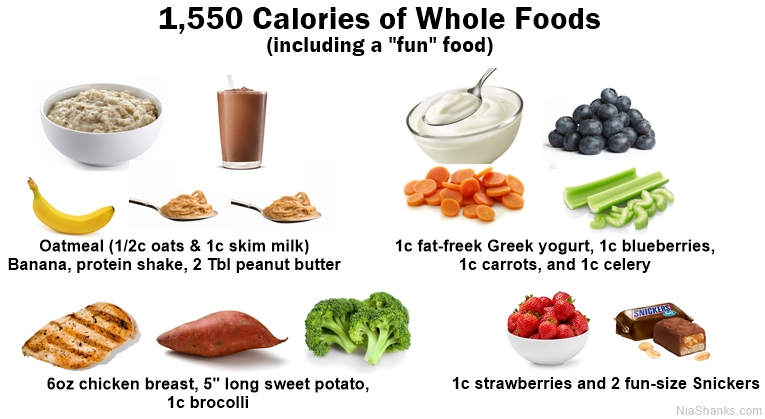 Whole foods provide greater satiety than heavily candy calorie-dumbo foods.
Whole foods provide greater satiety than heavily candy calorie-dumbo foods.
And, bonus, equally you lot tin see, Snickers tin can still be a office of a by and large whole-foods lifestyle. Deprivation has no place in eating healthy. Moderation is a habit worth developing.
This isn't to advise the results from both diets, if all else was equal, would be identical. If forcefulness training was part of the regimen yous may lose more fat and build more muscle with the whole-nutrient diet from consuming more nutrients and protein than the theoretical all-Snickers diet; no uncertainty your health would benefit from the former.
Practise You Need to Count Calories?
I would rather saw off the footling toe on my right foot with a rusty pocket knife than count calories. That do would send me plunging headfirst back into obsessive, matted eating habits. That is why I don't count calories, and why many of my clients with a like history don't either. It creates more than problems than information technology solves.
In that location are plenty of people who like tracking calories. It'south a lifestyle practice they savour, or one they find necessary to accomplish and maintain their goals, otherwise they get off track quickly.
The selection of tracking calories varies from person to person and depends on their goals and needs. Do what works all-time for you and avoid anything that exacerbates problems with food.
If you're not sure what you need to exercise, start by applying the above data for at least six weeks and run into what happens. Yous very well may not need to do anything else. Why make things more complicated than necessary? Endeavor the simplest things kickoff, and tweak only if necessary.
Some people don't need to count calories (or disdain the mere thought of doing so) yet could benefit from tracking certain foods or macronutrients.
What Should be Tracked?
Perchance something. Maybe null.
Permit'south say you want to lose weight. Y'all aptly employ the to a higher place information for half-dozen weeks but don't feel like you've made progress, and y'all don't desire to resort to counting calories. In other words, what should you do if you're eating healthy but even so can't lose weight?
Most people don't overeat lean protein, not-starchy vegetables, or fruits. You can track the two most likely culprits preventing fat loss: fat sources and "fun" foods.
Fat sources are calorically dense, and the calories can add up quickly. For instance, one-quarter cup of mixed basics contains 160 calories. If y'all consume out of the container instead of putting one serving into a basin, you may end upwardly eating one loving cup (I've been there and done that). Instead of eating 160 calories, it was 640. If you frequently eat high-fat foods like nuts and nut butters, avocados, cheese, olive oil drizzled on salads, track or measure those fat sources for a week. It may be helpful to measure a serving size of those foods to become aware of what a serving size truly is.
I dearest carbs. If I had my fashion a bucket of mashed potatoes would be considered one serving. If y'all eat more carb sources than fat, runway your starchy-vegetable and grain intake. You could try replacing some of the starchy vegetables with not-starchy vegetables (since they're lower in calories for an equal volume) or but decrease the serving portions a bit: instead of eating two heaping serving spoons of mashed potatoes, eat 1.
"Fun" foods can also be easy to overeat. It's not hard to eat a few also many tasty cookies or French chips or doughnuts. You lot may be eating more of those than you realize. Rail everything you consume and drinkable for a calendar week to see what's going on. Y'all may discover you snacked on a doughnut a few times throughout the week and drank a few sugar-loaded lattes y'all weren't bookkeeping for previously. Cull which "fun" foods to enjoy more than diligently. Either consume a smaller amount and/or swap them out for lower-calorie whole foods.
If fat loss is the goal and you lot're not losing weight, this means, very but, that yous're consuming besides many calories. Notice simple ways to eat fewer calories: consume more than veggies instead of whole grains, bandy out sugar-laden beverages for calorie-complimentary drinks, eat a good source of lean poly peptide with all meals, track fat sources, consume more high-volume, depression-calorie foods like non-starchy vegetables and fruits. It really tin be that simple.
The How to Eat Healthy Cheat Sheet
The in a higher place information could be distilled into this cheat canvass:
- Eat whole foods at least lxxx% of the time
- Make room for your favorite foods
- Think flexible, sustainable lifestyle — not a soul-sucking nutrition
- Consistency matters most — forget most perfection; this is not an "all or nothing" game
- Master the basics — no seriously, exercise them for months andyears
Want to Actually Modify How Your Body Looks?
Healthy eating and strength training go together like peanut butter and jelly. While proper nutrition can improve your health and is instrumental in losing body fat, an intelligent progressive strength training program is the tool that changes the shape of your body. Eating well tin aid you lose torso fat, but only strength training can help you maintain, and build, muscle.
For maximum results, combine the nutrition guidelines here with a progressive force training programme. Cheque out the women's beginner strength training guide or Elevator Like a Girl workout template to get started.
Desire to know when a new article is released? Want insider-just information not shared here? Enter your email below to bring together the newsletter.
Source: https://niashanks.com/simple-guide-how-to-eat-healthy/
Post a Comment for "what is the exact diet to eat daily for nutrtional perfection"